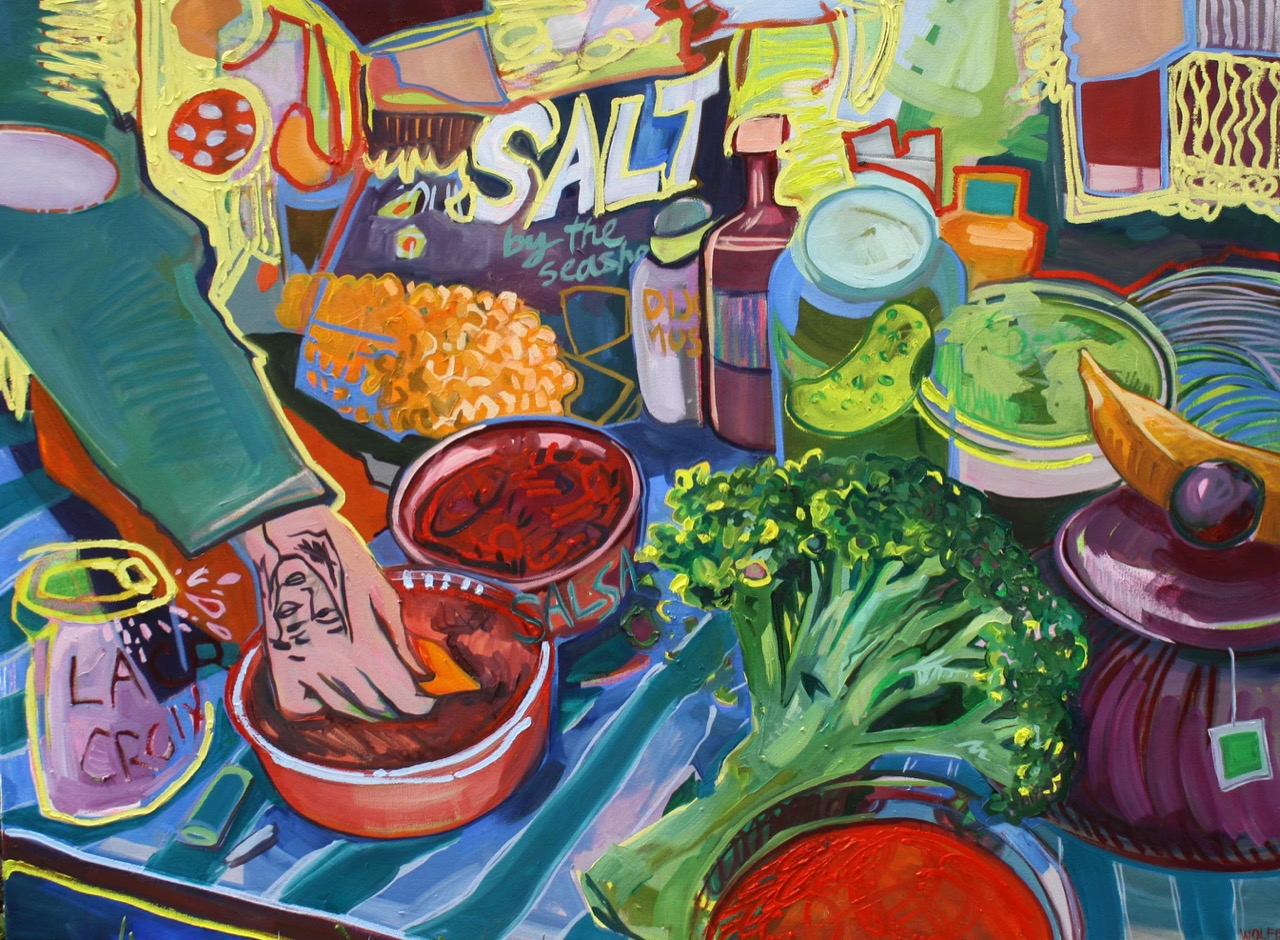South Side art exhibit celebrates food in a casual creative space


Snack Landscape, 2020. Gabrielle (Gabe) Wolfe.
“Buttery Spread,” an art exhibition that uses food as both a subject and a medium, invites visitors to indulge their child-like curiosity. Build a tower out of paper doritos. Look at a kayak shaped like a husk of corn. Peruse a zine that illustrates boobs as food –– or just sit on a velvet couch with fried-egg pillows and stay for a while.
Free to the public until Dec. 30 at the Brew House Arts Association on the South Side of Pittsburgh, “Buttery Spread” is an exhibit that “uses food as a starting point” to explore the roles it plays in peoples’ lives and the connections they form through it. In a range of mediums, including paintings, sculptures, fabric prints, zines, cookbooks and interactive art pieces, the exhibit’s featured artists look at food through an imaginative lens — one that encourages viewers’ joy and physical engagement.
For the exhibit’s curators, Emma Honcharski and Chas Wagner, accessibility is at the heart of their vision for “Buttery Spread.” Honcharski said the universality of food as a topic provides a starting ground for anyone to engage with the art.
“We can all participate in storytelling about food because it’s something that we all do,” Honcharski said. “You can ask anyone about a food memory and they’ll have something to say.”


Stephanie Garrison, the operations director at Brew House Arts, said while people can often put pressure on themselves when it comes to interacting with art or visiting public art spaces, the curators of “Buttery Spread” offer ways to alleviate that pressure.
“Sometimes people go into a gallery and see a painting that is abstract or they don’t have any context for it and they don’t know how to interact with it,” Garrison said. “I think [the curators] are really open to having the audience interpret this work how they want to interpret it.”
Honcharksi and Wagner also hope the playful elements of the exhibit can encourage visitors to feel comfortable personalizing their experience when visiting the gallery.
“Having a playful element opens people up to any kind of experience and takes them out of this binary of ‘Here’s what I should be thinking about,’” Honcharski said.
Beyond making the art-viewing experience feel accessible to the public, Honcharski and Wagner have encouraged visitors to make themselves at home in the exhibit space. With a shared passion for zine culture and non-digital self-publishing, Honcharski and Wagner sectioned off a part of a corner of the gallery as a reading room. In it, visitors can sit down on a velvet couch and read a wide collection of books and zines that center food in ways that range from alternative cookbooks to short stories that come with funky food pairings for the reader to meditations on agriculture and capitalism.
Through the reading room, Honcharksi and Wagner aim to add a new element of comfort to the typical art exhibit experience.
“Galleries can be cold and can be a place where you can take a lap and leave,” Honcharski said. “There aren’t very many places where you’re just welcome to spend time there and you don’t need to buy anything.”
Garrison said the reading room is making its intended impact.
“We’ve seen a lot of visitors stay much longer in this show than we have for other ones because I think comfort and accessibility,” Garrison said. “It’s okay to stay here in the same way that you would in a library or coffee shop.”
In the short essay, “Look, Touch, Eat,” part of the “Buttery Spread” exhibit guide, co-curator Wagner writes that the luxury of taking one’s time and enjoying the exhibit space fits with the theme of savoring the subject of the art itself — food — and the experiences we create around it.
“Having the opportunity to linger longer in the Brew House Arts space — without pressure to commercially transact — evokes the feeling of a home-cooked meal, savoring time spent in a gallery,” Wagner wrote.
Recent Posts
Opinion | TV is meant to push boundaries, not conform to the culture
TV shows can make us laugh and deliver 11 minutes of easy entertainment, but they…
Opinion | Polymarket is immoral
After the shock of seeing these horrible events being bet on, it's worth asking who…
A deep dive into the Beatles’ hit album, ‘Revolver,’ through a Pitt program
In a lecture hosted by Pitt’s Osher Lifelong Learning Institute, Stephen Schultz, professor of music…
Review | Bad Bunny’s ‘DeBÍ TiRAR MáS FOToS’ turns over a new leaf in an ode to Puerto Rico
Bad Bunny’s sixth album “DeBÍ TiRAR MáS FOToS,” which translates to “I should have taken…
Photos: Pitt men’s basketball falls to Clemson
Pitt men’s basketball falls to Clemson 78-75 in overtime at the Petersen Events Center. Former…
Pitt football recruiting update
Pitt football has gone through quite a bit of change since the end of its…

